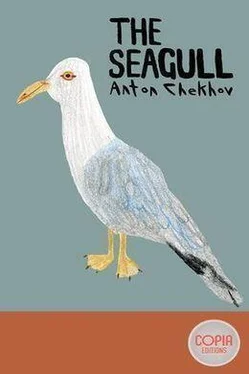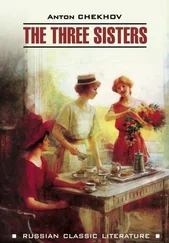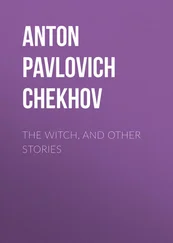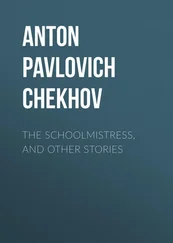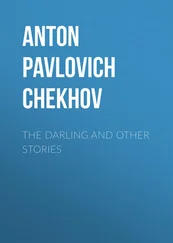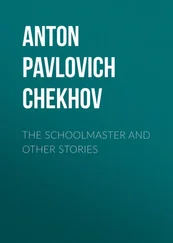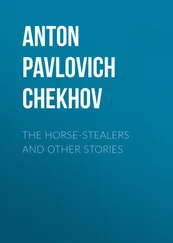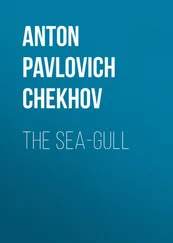Anton Chekhov - The Seagull
Здесь есть возможность читать онлайн «Anton Chekhov - The Seagull» весь текст электронной книги совершенно бесплатно (целиком полную версию без сокращений). В некоторых случаях можно слушать аудио, скачать через торрент в формате fb2 и присутствует краткое содержание. Год выпуска: 2014, Издательство: epubBooks Classics, Жанр: Драматургия, на английском языке. Описание произведения, (предисловие) а так же отзывы посетителей доступны на портале библиотеки ЛибКат.
- Название:The Seagull
- Автор:
- Издательство:epubBooks Classics
- Жанр:
- Год:2014
- ISBN:нет данных
- Рейтинг книги:3 / 5. Голосов: 1
-
Избранное:Добавить в избранное
- Отзывы:
-
Ваша оценка:
- 60
- 1
- 2
- 3
- 4
- 5
The Seagull: краткое содержание, описание и аннотация
Предлагаем к чтению аннотацию, описание, краткое содержание или предисловие (зависит от того, что написал сам автор книги «The Seagull»). Если вы не нашли необходимую информацию о книге — напишите в комментариях, мы постараемся отыскать её.
The Seagull — читать онлайн бесплатно полную книгу (весь текст) целиком
Ниже представлен текст книги, разбитый по страницам. Система сохранения места последней прочитанной страницы, позволяет с удобством читать онлайн бесплатно книгу «The Seagull», без необходимости каждый раз заново искать на чём Вы остановились. Поставьте закладку, и сможете в любой момент перейти на страницу, на которой закончили чтение.
Интервал:
Закладка:
NINA. But don't your inspiration and the act of creation give you moments of lofty happiness?
TRIGORIN. Yes. Writing is a pleasure to me, and so is reading the proofs, but no sooner does a book leave the press than it becomes odious to me; it is not what I meant it to be; I made a mistake to write it at all; I am provoked and discouraged. Then the public reads it and says: "Yes, it is clever and pretty, but not nearly as good as Tolstoi," or "It is a lovely thing, but not as good as Turgenieff's 'Fathers and Sons,'" and so it will always be. To my dying day I shall hear people say: "Clever and pretty; clever and pretty," and nothing more; and when I am gone, those that knew me will say as they pass my grave: "Here lies Trigorin, a clever writer, but he was not as good as Turgenieff."
NINA. You must excuse me, but I decline to understand what you are talking about. The fact is, you have been spoilt by your success.
TRIGORIN. What success have I had? I have never pleased myself; as a writer, I do not like myself at all. The trouble is that I am made giddy, as it were, by the fumes of my brain, and often hardly know what I am writing. I love this lake, these trees, the blue heaven; nature's voice speaks to me and wakes a feeling of passion in my heart, and I am overcome by an uncontrollable desire to write. But I am not only a painter of landscapes, I am a man of the city besides. I love my country, too, and her people; I feel that, as a writer, it is my duty to speak of their sorrows, of their future, also of science, of the rights of man, and so forth. So I write on every subject, and the public hounds me on all sides, sometimes in anger, and I race and dodge like a fox with a pack of hounds on his trail. I see life and knowledge flitting away before me. I am left behind them like a peasant who has missed his train at a station, and finally I come back to the conclusion that all I am fit for is to describe landscapes, and that whatever else I attempt rings abominably false.
NINA. You work too hard to realise the importance of your writings. What if you are discontented with yourself? To others you appear a great and splendid man. If I were a writer like you I should devote my whole life to the service of the Russian people, knowing at the same time that their welfare depended on their power to rise to the heights I had attained, and the people should send me before them in a chariot of triumph.
TRIGORIN. In a chariot? Do you think I am Agamemnon? [They both smile.]
NINA. For the bliss of being a writer or an actress I could endure want, and disillusionment, and the hatred of my friends, and the pangs of my own dissatisfaction with myself; but I should demand in return fame, real, resounding fame! [She covers her face with her hands] Whew! My head reels!
THE VOICE OF ARKADINA. [From inside the house] Boris! Boris!
TRIGORIN. She is calling me, probably to come and pack, but I don't want to leave this place. [His eyes rest on the lake] What a blessing such beauty is!
NINA. Do you see that house there, on the far shore?
TRIGORIN. Yes.
NINA. That was my dead mother's home. I was born there, and have lived all my life beside this lake. I know every little island in it.
TRIGORIN. This is a beautiful place to live. [He catches sight of the dead sea–gull] What is that?
NINA. A gull. Constantine shot it.
TRIGORIN. What a lovely bird! Really, I can't bear to go away. Can't you persuade Irina to stay? [He writes something in his note–book.]
NINA. What are you writing?
TRIGORIN. Nothing much, only an idea that occurred to me. [He puts the book back in his pocket] An idea for a short story. A young girl grows up on the shores of a lake, as you have. She loves the lake as the gulls do, and is as happy and free as they. But a man sees her who chances to come that way, and he destroys her out of idleness, as this gull here has been destroyed. [A pause. ARKADINA appears at one of the windows.]
ARKADINA. Boris! Where are you?
TRIGORIN. I am coming this minute.
He goes toward the house, looking back at NINA. ARKADINA remains at the window.
TRIGORIN. What do you want?
ARKADINA. We are not going away, after all.
TRIGORIN goes into the house. NINA comes forward and stands lost in thought.
NINA. It is a dream!
The curtain falls.
Act III
The dining–room of SORIN'S house. Doors open out of it to the right and left. A table stands in the centre of the room. Trunks and boxes encumber the floor, and preparations for departure are evident. TRIGORIN is sitting at a table eating his breakfast, and MASHA is standing beside him .
MASHA. I am telling you all these things because you write books and they may be useful to you. I tell you honestly, I should not have lived another day if he had wounded himself fatally. Yet I am courageous; I have decided to tear this love of mine out of my heart by the roots.
TRIGORIN. How will you do it?
MASHA. By marrying Medviedenko.
TRIGORIN. The school–teacher?
MASHA. Yes.
TRIGORIN. I don't see the necessity for that.
MASHA. Oh, if you knew what it is to love without hope for years and years, to wait for ever for something that will never come! I shall not marry for love, but marriage will at least be a change, and will bring new cares to deaden the memories of the past. Shall we have another drink?
TRIGORIN. Haven't you had enough?
MASHA. Fiddlesticks! [She fills a glass] Don't look at me with that expression on your face. Women drink oftener than you imagine, but most of them do it in secret, and not openly, as I do. They do indeed, and it is always either vodka or brandy. [They touch glasses] To your good health! You are so easy to get on with that I am sorry to see you go. [They drink.]
TRIGORIN. And I am sorry to leave.
MASHA. You should ask her to stay.
TRIGORIN. She would not do that now. Her son has been behaving outrageously. First he attempted suicide, and now I hear he is going to challenge me to a duel, though what his provocation may be I can't imagine. He is always sulking and sneering and preaching about a new form of art, as if the field of art were not large enough to accommodate both old and new without the necessity of jostling.
MASHA. It is jealousy. However, that is none of my business. [A pause. JACOB walks through the room carrying a trunk; NINA comes in and stands by the window] That schoolteacher of mine is none too clever, but he is very good, poor man, and he loves me dearly, and I am sorry for him. However, let me say good–bye and wish you a pleasant journey. Remember me kindly in your thoughts. [She shakes hands with him] Thanks for your goodwill. Send me your books, and be sure to write something in them; nothing formal, but simply this: "To Masha, who, forgetful of her origin, for some unknown reason is living in this world." Good–bye. [She goes out.]
NINA. [Holding out her closed hand to TRIGORIN] Is it odd or even?
TRIGORIN. Even.
NINA. [With a sigh] No, it is odd. I had only one pea in my hand. I wanted to see whether I was to become an actress or not. If only some one would advise me what to do!
TRIGORIN. One cannot give advice in a case like this. [A pause.]
NINA. We shall soon part, perhaps never to meet again. I should like you to accept this little medallion as a remembrance of me. I have had your initials engraved on it, and on this side is the name of one of your books: "Days and Nights."
TRIGORIN. How sweet of you! [He kisses the medallion] It is a lovely present.
NINA. Think of me sometimes.
TRIGORIN. I shall never forget you. I shall always remember you as I saw you that bright day—do you recall it?—a week ago, when you wore your light dress, and we talked together, and the white seagull lay on the bench beside us.
Читать дальшеИнтервал:
Закладка:
Похожие книги на «The Seagull»
Представляем Вашему вниманию похожие книги на «The Seagull» списком для выбора. Мы отобрали схожую по названию и смыслу литературу в надежде предоставить читателям больше вариантов отыскать новые, интересные, ещё непрочитанные произведения.
Обсуждение, отзывы о книге «The Seagull» и просто собственные мнения читателей. Оставьте ваши комментарии, напишите, что Вы думаете о произведении, его смысле или главных героях. Укажите что конкретно понравилось, а что нет, и почему Вы так считаете.
